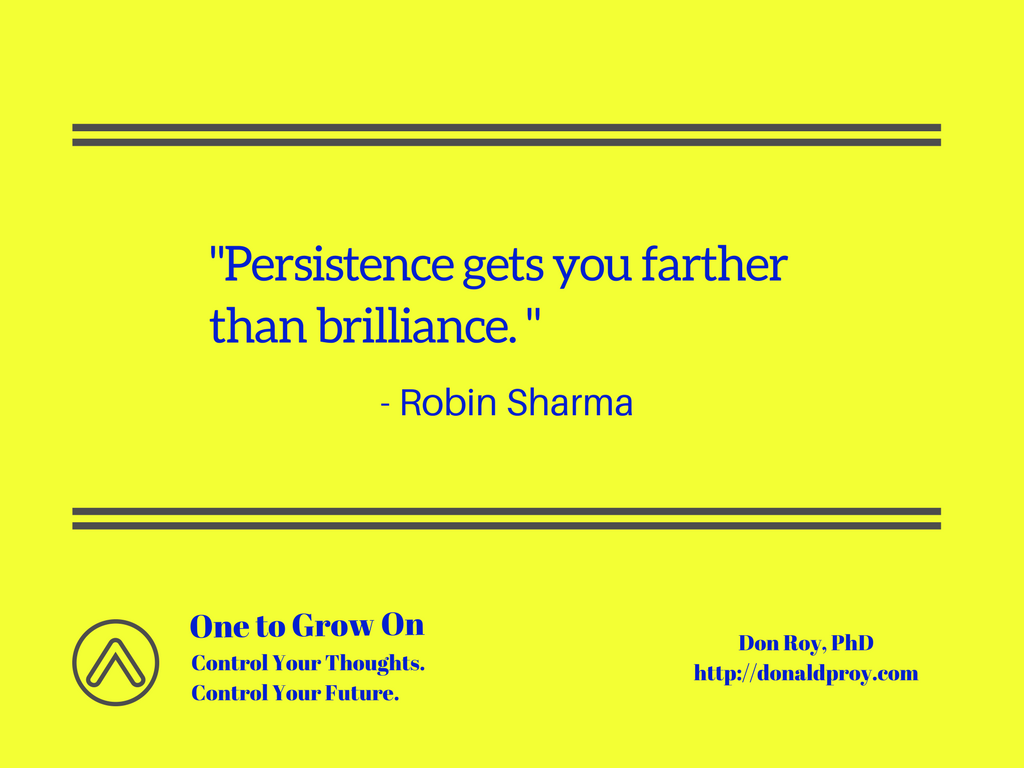Doing great work and attaining high levels of achievement are aspirations most people have. Who wouldn’t want to be known as being among the best at what they do? We look at leaders in our field and marvel at the brilliant work they consistently produce. Each article, podcast, speech, or book reflects mastery and occupying rarefied air within their field. We may want to get there but are discouraged because we do not see ourselves as having what it takes to become great at what we do.
This lament is not an objective assessment of our limitations. Rather, it is a dangerous form of self-sabotage. You may not be brilliant at what you do… nor do you need to be. The fuel that moves us forward is persistence, consistently doing the work. Leadership expert and author Robin Sharma says persistence will do more for our personal growth than being brilliant.
 The Brilliance Trap
The Brilliance Trap
If persistence will do more to advance our development than brilliance, then why do we still chase achieving greatness? You do not hear many professional golfers say “I want to be the most persistent golf pro in the world.” Instead, their aspirations deal with measurable outputs—achieving a high rank, winning tournaments, or winning major championships. Yet, the pursuit of brilliance keeps us from winning tournaments or whatever the measuring stick we use.
We fall into what could be called the brilliance trap for the following reasons:
- Focus is on the result, not the process. We associate brilliance with results achieved, but the truth is the results would never happen without following a process (i.e., hard work) to get there. Our focus on results and the benefits associated them means we overlook the necessity to take small steps forward daily toward the big goal.
- Brilliance is more fun than persistence. It is more enjoyable to bask in the glory that radiates from brilliance than the grunt work that takes place in the trenches. Many people want to write a book but cannot discipline themselves to consistently write and inch closer to their goal. John Grisham says if you would write 200 words a day you could complete a novel in two years. The latter sounds cool; the former requires commitment and resolve.
- Great work is equated with brilliance. We see the output of high performers in our field and attribute it to talent or even luck. The work required to rise to a peak performance level goes unseen. We assume hard work played a role in that person’s ability to do brilliant work, but we are not there to witness the preparation and sacrifices made to hone a high performer’s abilities and skills. The potential for doing brilliant work is a gift, but it is also like a muscle that can be strengthened through persistence.
How to be Persistent
Becoming more persistent is a trait I want to develop. It will enable me to follow through more consistently on ideas and plans. I have made strides in this area thanks in part to three tools that give me direction.
- Setting goals. I write down what I want to achieve, setting trimester goals (four-month cycles). This time frame fits nicely with the fall, spring, and summer semester schedules under which I work as an academic. You probably have heard the statistic before that 97% of people do not write down goals. It is invaluable for me as it gives me end results at which to aim. Otherwise, I fear I would not make best use of time and not complete as many projects.
- Identifying next steps. Goals set the finish line we want to cross. Now, all that has to be done is figuring out how to get there. This small yet crucial detail trips up many good intentions. For any goal set, break it down in to weekly and even daily actions that must be completed in order to advance toward goal attainment. Persistence is needed to follow through in order to transform goals from dreams to reality.
- Managing time. The hyper-distracting environment in which we live is a threat to persistence. It is not hard to go from researching a topic to scrolling through your Facebook page (speaking from first-hand experience on this one). A time management device that has helped me focus and be more persistent is the Pomodoro technique. The premise of this technique is to work in 25-minute blocks of time, taking short breaks between blocks. During a 25- minute block, work on only one task. It has been a game changer for me.
Be Persistent to be Great
Greatness is not reserved for a select few. However, you have be incredibly persistent to get there. Malcolm Gladwell wrote about the 10,000 hour rule in Outliers. He asserted that high level performers typically invested many, many hours of preparation and work to become exceptional. Persistence versus brilliance reminds me of the race between the tortoise and the hare. The tortoise relied on persistence (he sure did not have speed) to eventually overtake the hare and win the race. Similarly, we should look to persistence as the secret to our growth. It has the potential to take us farther than any brilliance bestowed upon us.

